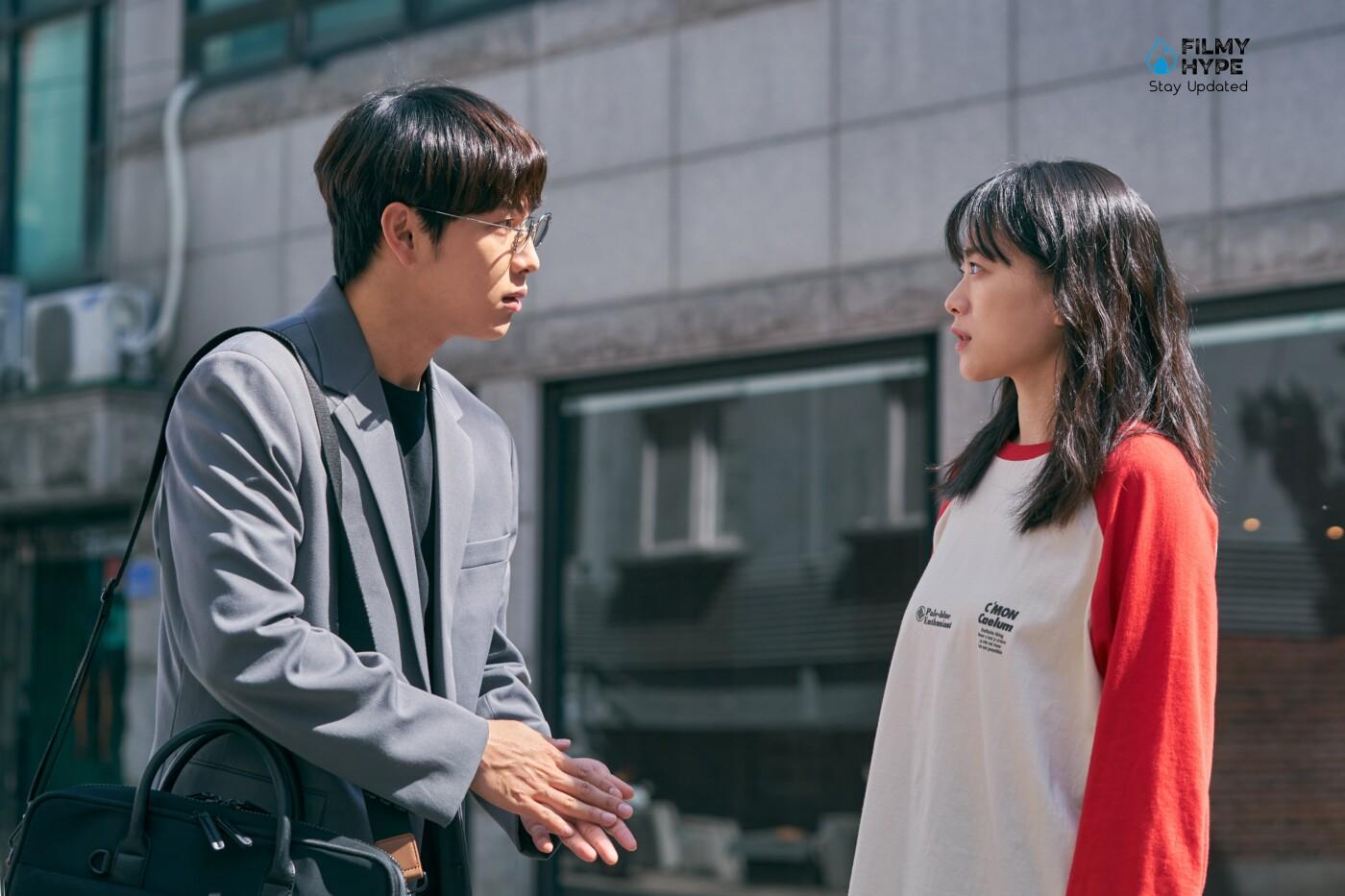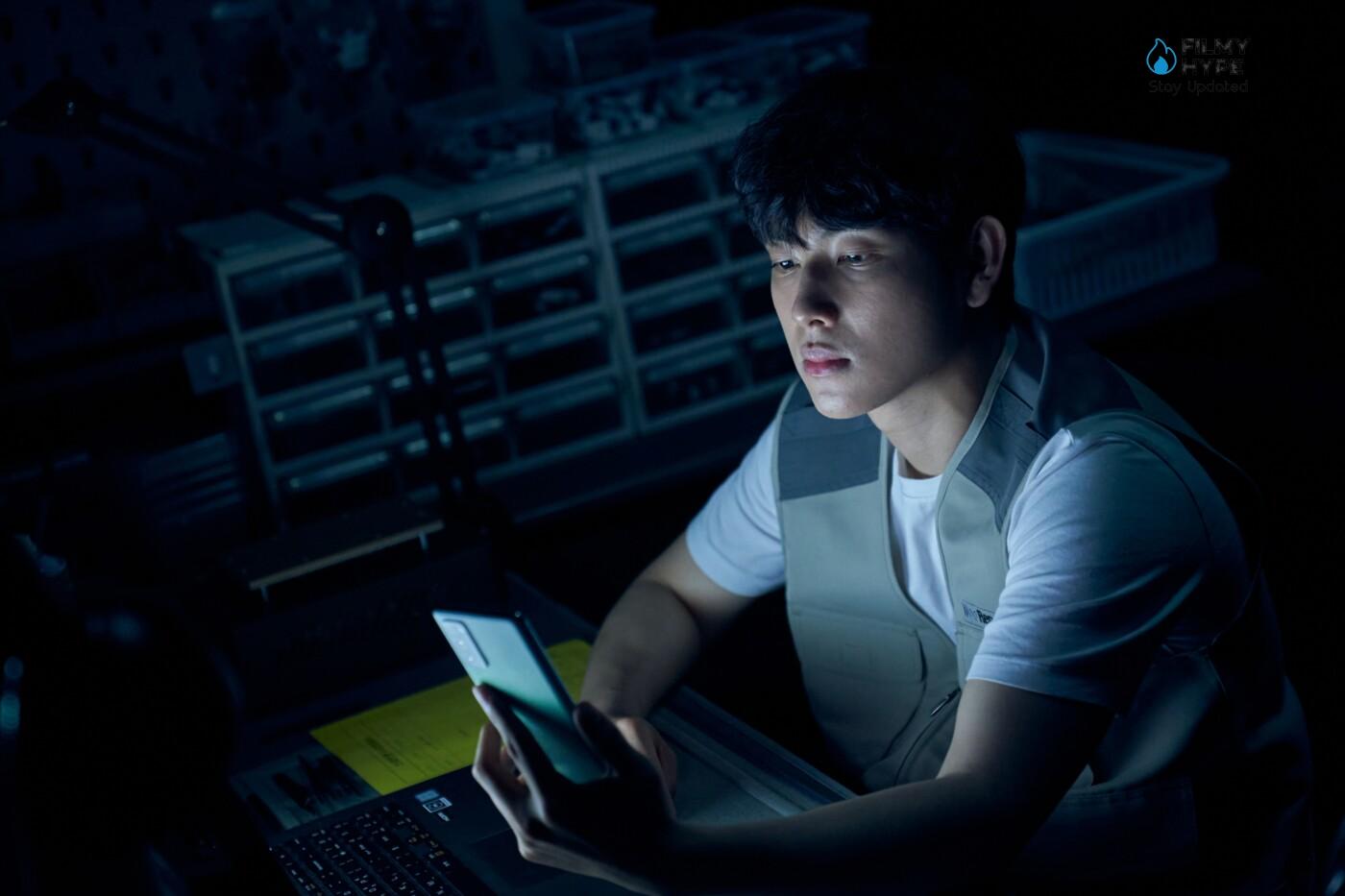Unlocked Movie Review: Korean Movie Tells Us About Life Inside the Smartphone
Cast: Chun Woo-hee, Yim Si-wan, Kim Hie-won
Director: Kim Tae-joon
Streaming Platform: Netflix
Filmyhype.com Ratings: 3.5/5 (three and a half stars)
Unlocked Netflix Korean movie review, murder investigation genre the story of a woman’s life turned upside down After a mobile phone accidentally falls into the hands of a dangerous person who uses it to follow her every step. What if someone could access our smartphone and, through all the information inside, intrude on our lives? This is what happens to the protagonist of Unlocked, the new Netflix Korean thriller based on the novel of the same name by Akira Teshigawara, which has already become a feature film in 2018 (Stolen Identity). As we will see in our review of Unlocked, the film that marks Kim Tae-joon’s directorial debut has particularly current premises from his side, which make the events even more realistic and disturbing, and satisfactory interpretations by its leading actors. Too bad for the script which, at times, struggles to hold the reins of the two maxi subplots that develop almost independently.

Unlocked Review: The Story Plot
Returning home after an evening of karaoke with friends, Nami (Chun Woo-hee), a young employee of a startup, loses her smartphone on the bus. It is recovered by Jun-yeong (Yim Si-wan), an employee of a cell phone repair shop who, without revealing his identity, returns the device to its rightful owner; but not without first installing spyware on the phone, thanks to which the boy can not only access all of Nami’s private information – from her home address to the balance of her bank account – but also follow her in her daily movements and listen to his conversations. Meanwhile, Detective Ji-man (Kim Hee-won) is on the trail of the perpetrator of a heinous crime against a young woman; there seem to be no relevant traces at the scene of the murder,
A Korean movie based on a Japanese novel by Akira Shiga who was a writer on the threat of technology before. The previous story was made into a movie, Stolen Identity, with 2 parts, it is a story about a young woman who lost her mobile phone. and began to be threatened with chaos due to leaked personal information Before another corpse appeared on the mountain the plot of the previous story and this story almost took off the same mold But this time is Korean-made only. The title of the plot even made me think that it was a serial murder genre. But the real story rather focuses on the problem of mobile phone addiction among people currently.
Unlocked Review and Analysis
The premise of Unlocked is as simple as it is timely. Nowadays, if someone had access to everything that our smartphone contains, they could go back to almost all the information concerning our life. And, consequently, have us in hand. This is exactly what happens to Nami, whose existence is first plumbed and then crumbled piece by piece by an unscrupulous individual who uses a simple cell phone as a weapon. As the narration progresses, we observe Jun-Yeong sneaking into Nami’s daily life with extreme ease, in a crescendo of privacy violation: from reading messages and listening to phone calls to spying on her through the front camera, up to intruding on her work and in his relationships. An idea – the one developed in the course of the film as disturbing as it is realistic, made even more terrifying by the awareness that it could happen to anyone: the protagonist is nothing more than an ordinary girl, with an ordinary job and a smartphone that uses for many hours during the day.

By alternating between Jun-yeong’s view from the screen and Nami’s point of view as she moves on with her life, the director expertly builds a tension that lasts until the very end. The flaw in the Unlocked script begins to emerge when the second narrative strand of the film comes into play, namely the one in which we witness Detective Ji-man’s search for a vicious serial killer. We deduce from the beginning that what is happening to Nami cannot simply be labeled as a case of stalking but is part of a wider network of heinous crimes. Yet, although the two subplots are indisputably linked, they remain completely independent up to the last half hour of the film, giving the impression of being faced with a somewhat unrelated script. The screenplay also suffers from the presence of some overly simplistic explanations of not-too-logical behaviors implemented by its protagonists.
Chun Woo-hee and Yim Si-wan, two South Korean actors who are quite well known at home, give a very convincing performance, able to sustain an often-uneven plot pace. Nami’s character makes a significant evolution, from an ordinary girl with a tendency to trust too much to a strong protagonist, determined to put an end to the abuses she has suffered. Jun-Yeong, on the other hand, always remains the same, just as he is supposed to be a rational, sociopathic criminal of his caliber. Less convincing, however, is the detective Ji-man played by Kim Hie-won, not so much for the actor’s acting but for the indecipherability of many of his behaviors.
The story focuses on the problem of the protagonist who is addicted to heavy mobile phones all day and night. This is not strange because people nowadays are almost like this. The story, therefore, presents the danger of this point for those who are aware. Since the original Japanese title which translates into English for a long time, “Just lost my mobile phone. Why becomes a corpse?”. That is, asking the onlookers to wonder why this could turn into a murder case. All in all, the story is about the devastating consequences of depositing your entire life’s data on your phone. Which, if it falls into the hands of villains like in the story, is an instant disaster in which the story tries to show the criminal’s psyche that chooses to act with the victims that he keeps the mobile phone. It’s not straight-up murder. It is the use of the victim’s information to reciprocate the pain points of their past to the victim in the same way. This makes the story more about hacking mobile phones to destroy people’s lives with only the background that the culprit had committed a murder and had hidden several bodies before that if anyone wants to watch the slaughter scene. This is not there but what I get is the secret horror of the villain who looks to hurt the victim more mentally.

In addition, the movie tries to play with the protagonist’s police investigation. Who opened the story to find a body on the mountain and found some evidence indicating that the culprit was probably his son who ran away from the house disappeared in which the story will alternate with the story that the heroine was threatened before slowly connecting these two people to meet With the family problem of the police father pushing for this kind of story. It is a link that reflects real social problems. But this part of the police investigation is also the big weakness of the story. Because the father who is a policeman tries to do everything to catch his son Without reporting this matter to the station, The story, therefore, doesn’t seem very reasonable with the work of the police in the story, even though the story is quite large at that level.
Another part that may be a bit of a blemish is the choice of a handsome boy band star Im Si-wan, also known as Si-wan, who is a South Korean singer and actor. Come to act as a psychopathic villain who looks handsome and clear. Oppa has too much to eat. It is understandable that Korea likes to use handsome actors. take on the role of a psychopathic character While the heroine is played by Chun Woo Hee who looks like homely look. Normal like a normal office girl Accidentally unlucky from a falling mobile phone Makes this look more believable than the villain who is so overly handsome. (The bad background is People without ID cards Out of the barbarian outside the system). Overall, it is a Korean movie that is fun to watch and exciting with the mental action of villains quite well It also helps to make people aware of the dangers of technology addiction as well.
Unlocked Review: The Last Words
The film that marks Kim Tae-joon’s directorial debut has particularly current premises on its side, which make the events even more realistic and disturbing, and satisfactory interpretations by its leading actors. Too bad for the screenplay which, at times, struggles to hold the reins of the two maxi subplots that develop almost independently. Even though it’s positioned as a homicide investigation from the beginning It may disappoint the viewers who hope for brutal killing scenes. Including police investigative parts that look overpowering and not very reasonable.






